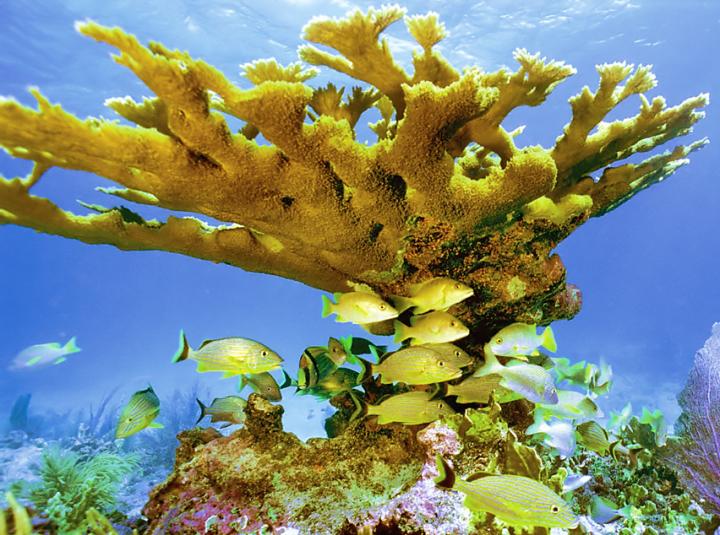
Credit: William Precht, Dial Cordy & Associates, Inc.
Coral genotypes can survive for thousands of years, possibly making them the longest-lived animals in the world, according to researchers at Penn State, the National Marine Fisheries Service and Dial Cordy & Associates.
The team recently determined the ages of elkhorn corals — Acropora palmata — in Florida and the Caribbean and estimated the oldest genotypes to be over 5,000 years old. The results are useful for understanding how corals will respond to current and future environmental change.
"Our study shows, on the one hand, that some Acropora palmata genotypes have been around for a long time and have survived many environmental changes, including sea-level changes, storms, sedimentation events and so on," said Iliana Baums, associate professor of biology, Penn State. "This is good news because it indicates that they can be very resilient. On the other hand, the species we studied is now listed as threatened under the U.S. Endangered Species Act because it has suffered such sharp population declines, indicating that there are limits to how much change even these very resilient corals can handle."
According to Baums, many people mistake corals for plants or even non-living rocks, but corals actually consist of colonies of individual invertebrate animals living symbiotically with photosynthetic algae.
"Previously, corals have been aged by investigating the skeletons of the colonies or the sizes of the colonies," she said. "For example, bigger colonies were thought to be older. However many coral species reproduce via fragmentation, in which small pieces break off from large colonies. These pieces look like young corals because they are small, but their genomes are just as old as the big colony from which they broke. Similarly, the big colonies appear younger than their true age because they became smaller during the process of fragmentation."
Now, for the first time, Baums and her colleagues have used a genetic approach to estimate the ages of corals. The method determines when the egg and the sperm originally met to form the genome of the coral colonies. The researchers then tracked the number of mutations that accumulated in the genome since that time. Because mutations tend to arise at a relatively constant rate, the researchers were able to estimate an approximate age in calendar years of the coral genomes in their study.
The results, which appear in print in the November 2016 issue of the journal Molecular Ecology, suggest that some Acropora palmata genomes have been around for over 5,000 years.
"This was surprising, as previously, only cold-water corals were found to be older than 1,000 years," said Baums. "Knowing the age of individuals in a population is important for understanding their population history and whether the population is increasing or decreasing. It is especially important when the population under study is threatened. "If Acropora palmata genomes have persisted over hundreds to thousands of years, it implies persistence through substantial environmental changes, and possibly gives hope that they can survive additional anticipated climate change. What is different now is that human-induced climate change is happening at a rate that far exceeds past environmental changes. Therefore, the coral's past ability to survive environmental change does not necessarily predict their future success."
###
Other authors on the paper include Meghann Devlin-Durante, senior research technologist, Penn State; Margaret Miller, ecologist, NOAA; and Bill Precht, director, Marine & Coastal Programs, Dial Cordy & Associates. The Caribbean Acropora Research group also assisted with the paper — Lia Carne, Fragments of Hope; Tyler Smith, University of the Virgin Islands; Anastazia Banaszak, Universidad Nacional Autónoma de México; Lisa Greer, Washington and Lee University; Adele Irwin, Washington and Lee University; and Nicole Fogarty, Nova Southeastern University.
The National Science Foundation and the National Marine Fisheries Service supported this work.
Media Contact
A'ndrea Elyse Messer
[email protected]
814-865-9481
@penn_state
http://live.psu.edu
############
Story Source: Materials provided by Scienmag





